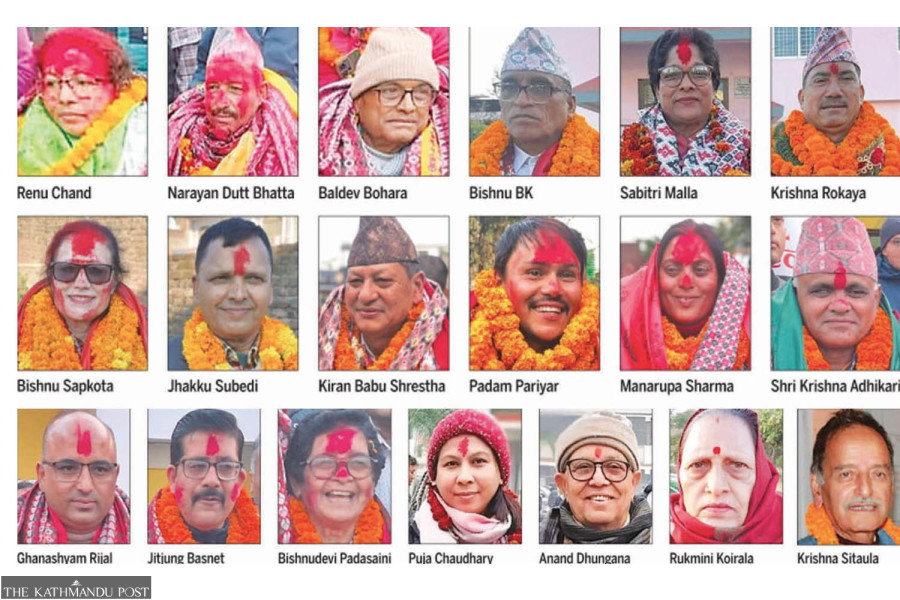Politics
UML loses seven upper house seats, even as it pulls off surprise victory in Koshi
The party falls to the third position as the Maoists become the largest force in the National Assembly.
Binod Ghimire
Despite commanding majority vote shares in all provinces, the ruling alliance has lost one of the 19 seats in the National Assembly that were up for grabs on Thursday, to the main opposition CPN-UML.
Rukmini Koirala, a UML candidate from the Koshi Province, registered victory, defeating Champa Devi Karki of the CPN (Maoist Centre) after some ruling alliance voters cast their ballots for the opposition candidate. Of the total vote weightage of 10,165 in the province, the ruling alliance had a combined strength of 5,474 against 4,604 of the opposition UML-Rastriya Prajatantra Party alliance.
However, Koirala secured 5,086 vote weightage against Karki’s 4,992 to win the race. “It seems some Congress and Unified Socialist voters didn’t vote for our candidate,” Ganesh Shah, a Maoist secretary, told the Post. “This will lead to a deficit of trust among the coalition partners and will be seriously discussed in the alliance’s meetings.”
This is not the first time parties in the ruling alliance have been accused of betraying each other in the upper house elections. In the 2022 elections, for instance, Sonam Gyaljen Sherpa, the UML candidate in Koshi, defeated Hem Raj Rai, the Janata Samajbadi Party candidate, despite the ruling alliance being poised to win the election comfortably.
On Thursday, though the ruling alliance lost Karki’s seat in Koshi, Krishna Prasad Sitaula, a Nepali Congress candidate in the province, won the election defeating Uddhab Poudel, a Rastriya Prajatantra Party candidate supported by the UML.
Candidates from the ruling alliance clean-swept the seats in six other provinces.
Among the 19 seats where the elections were held on Thursday, the Congress won all 10 seats that it contested. While the Maoist Centre won five of the six seats it contested, the CPN (Unified Socialist) and the Janata Samajbadi Party grabbed two and one seats, respectively.
Only five out of eight parties in the fray won one or more seats, according to Shaligram Sharma Paudel, spokesperson for the Election Commission. Though 12 parties had registered to contest the polls, only eight fielded their candidates.
Rastriya Prajatantra Party, Janamat Party and Nepal Majdoor Kishan Party couldn’t win a single seat in the election that was boycotted by independently elected local representatives. Balendra Shah, mayor of Kathmandu Metropolitan City, and Harka Raj Rai, mayor of Dharan Sub-metropolitan City, are among those who boycotted the vote.
Thursday’s election was a big setback to the UML, which is now reduced to the third position in the upper house from the first with 17 seats. The ruling alliance won seven of the eight seats the UML has been holding. Similarly, as a candidate close to ruling parties will be nominated in the seat of Bimala Rai Paudyal, the second largest party in the House of Representatives has been reduced to mere nine seats. The seat Paudyal currently holds will be filled through nomination by the President on the government’s recommendation.
The Maoist Centre with 17 seats has become the largest party in the upper house, followed by the Congress, which now has 16 seats.
The Prime Minister Pushpa Kamal Dahal-led party holds a distant third position with just 32 seats in the 275-member lower house.
The ruling parties—Congress, Maoist Centre, Unified Socialist and Janata Samajbadi Party—had fielded common candidates based on a seat-sharing deal but the UML had contested alone except in Koshi.
As per the agreement in the ruling alliance, the Congress, the largest party in the coalition, had fielded 10 candidates. The Maoist Centre had fielded candidates for six positions, while the Unified Socialist and the Janata Samajbadi Party had fielded two and one, respectively.
An electoral college of provincial assembly members, chairs and vice-chairs of rural municipalities, and mayor and deputy mayors of municipalities, metropolis and sub-metropolis voted on Thursday to elect 19 of 20 upper house seats (besides the one to be nominated by the President) in the House that are going vacant from March 3.
Four of the vacancies were from the Bagmati Province, three each from Gandaki, Karnali and Sudurpaschim provinces, and two each from Koshi, Madhesh and Lumbini.
As many as 549 provincial assembly members and 1,498 chiefs and their deputies of local units were eligible to vote in the upper house election. Their votes had a combined weightage of 57,559. A vote of the provincial assembly member carries a weightage of 53, whereas the chiefs and deputy chiefs of the local units each weigh 19.
The election for a third of the 59 seats in the Assembly is held every two years. While 56 members are elected through votes in all seven provinces, three are nominated by the President on the government’s recommendation. The newly elected members join Parliament on March 3.




 18.12°C Kathmandu
18.12°C Kathmandu















